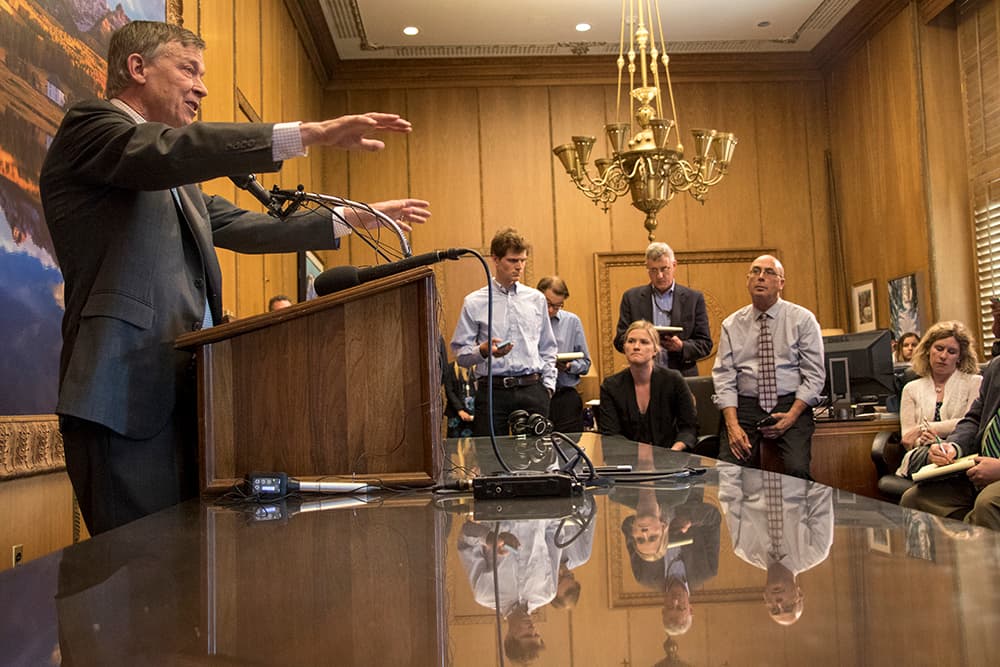
Gov. John Hickenlooper vetoed four bills Tuesday, including legislation that would have added autism spectrum disorder to the list of conditions treatable with medical marijuana. The bill would have allowed parents or guardians to use medical marijuana to treat children with autism.
U.S. Rep. Jared Polis, a fellow Democrat, was the first gubernatorial candidate to respond, issuing a release Tuesday evening saying he would have signed all three bills vetoed by Hickenlooper.
He said would like to see the medicinal marijuana bill reintroduced next session. The bill had overwhelming support in the House.
"Unfortunately, in the past two days our governor has vetoed three significant pieces of legislation that would have helped Colorado families and businesses,” Polis said in the statement. “HB 1263, led by Rep. Hooton and Sen. Fenberg, would have helped Coloradans with autism receive the care that will help them go to school, start careers, and live fulfilling lives.”
Three Republican candidates weighed in on Hickenlooper's decision during a debate hosted by Colorado Public Television on Wednesday.
A campaign manager for Republican gubernatorial candidate Greg Lopez said he would be in “rare agreement” with Hickenlooper due to the reasons cited by Hickenlooper. He said something similar during the debate.
"I think we need to be very cautious when we move forward with marijuana," Lopez said during the debate.
Similarly, Republican Doug Robinson said he agreed with all three vetoes. In a statement released earlier Wednesday, Robinson said he would like to explore the effects of CBD oils, which is a substance in marijuana, and its potential for treatment.
"They're bad for Colorado families," Robinson said of the three bills during the debate.
Victor Mitchell differed from his opponents. He said he would have signed the bill allowing medicinal marijuana's use to treat autism, but he would have vetoed the other two bills. He said he sees a lot of promise in using medical marijuana for treating certain conditions, including opioid addiction.
Democratic candidate Mike Johnston said in a statement that he thinks there can be some middle ground on the option, "giving immediate access to parents who want to experiment with cannabis as a treatment for their children with autism."
"We also must act now to build the evidence base to make a final decision on this issue by funding a trial here in Colorado with Colorado families that want to participate," Johnston said in his statement.
Campaigns for Cary Kennedy, Lt. Gov. Donna Lynne and State Treasurer Walker Stapleton did not immediately respond to a request for a comment on how they would have reacted to the bill.
Out of the nine bills Hickenlooper vetoed this year, three were related to marijuana consumption and its growing industry.
One would have allowed for marijuana tasting rooms and another would have allowed for more investment flexibility for marijuana businesses.
The discussion about its possible effects is far from over. On Wednesday, Hickenlooper's office said that Lt. Gov. Donna Lynne signed an executive order that would instruct the State Board of Health to look further into how medical marijuana could be used to treat autism spectrum disorder in children. The order was signed by Lynne because Hickenlooper was traveling out of state, the release said.
Hickenlooper said in a statement announcing the veto on Tuesday that he was "sympathetic" to families hoping to use this option to treat children.
Hours before announcing his veto decision, Hickenlooper — who has previously said he would have reversed the state’s legalization bill — met with families with children with autism on Tuesday in his offices. He spoke to media afterward, speaking while those same families and their kids looked on.
“The concern is that there might be unintended consequences of marijuana to people on the spectrum, not all, but just certain subsets,” Hickenlooper said on Tuesday. “As soon as we legalize it, we’re essentially saying, you know, this is, government (that) people rely on them to protect them from adverse consequences from taking pharmaceuticals of any kind, that this might trigger, in some kids ... really negative consequences.”













